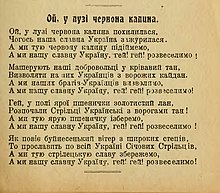Type a search term to find related articles by LIMS subject matter experts gathered from the most trusted and dynamic collaboration tools in the laboratory informatics industry.
| "Oi, u luzi chervona kalyna" | |
|---|---|
 Image of a 1922 print of the song | |
| Song | |
| Language | Ukrainian |
| English title | Oh, the Red Viburnum in the Meadow |
| Released | 1914 |
| Genre | patriotic |
| Songwriter(s) | Stepan Charnetsky |
"Oh, the Red Viburnum in the Meadow" (Ukrainian: Ой у лузі червона калина) is a Ukrainian patriotic march first published in 1875 by Volodymyr Antonovych and Mykhailo Drahomanov.[1][2][3] It was written in a modern treatment by the composer Stepan Charnetsky in 1914, in honor and memory of the Sich Riflemen of the First World War. The song has many variations.
The song "Oi u luzi" was in the repertoire of Feodor Chaliapin.[4]
The red viburnum (kalyna in Ukrainian)—a deciduous shrub that grows four to five metres tall—is a national symbol of Ukraine.[5] A silhouette of it is depicted along the edges of the flag of the president of Ukraine.
Following the 2014 annexation by Russia of the Ukrainian Crimean peninsula, and then the 2022 Russian invasion of Ukraine, singing "nationalist anthems" such as Chervona Kalyna in Crimea became punishable by fines and imprisonment.
Due to the song's association with the Ukrainian people's aspiration for independence, singing the song was banned during the period in which Ukraine was a Soviet Republic (1919-1991). Nevertheless, Ukrainian patriots sang it with defiance, as anyone caught singing it was jailed, beaten, and even exiled.[6][7] The song was also used by the Ukrainian Insurgent Army.[8][9][better source needed]
Red Viburnum berries (kalyna) is a symbol that has been a part of the Ukrainian culture since ancient times.[5]

In March 2022, the song gained international attention when an Instagram video[10] of an a cappella rendition by Andriy Khlyvnyuk of the Ukrainian band BoomBox singing the first verse of the song was remixed by different artists around the world. The melody was somewhat changed, literally in the first line of the chorus the last syllable is sung in ascending sixth. According to Valentyna Kuzyk, in this variant, the energy of the primordial breath breaks out of stable forms and enters a new life space.[11]
BoomBox was touring in the United States when the Russian invasion of Ukraine started on 24 February. In response to the invasion, Khlyvnyuk cut the tour short to return to Ukraine in order to join the armed forces. He recorded the video while wearing army fatigues, standing near Sophia Square in Kyiv, Ukraine, and uploaded it to his Instagram account on 27 February, where it became viral.

The first artist to remix[12] Khlyvnyuk's rendition was South African musician The Kiffness in early March.[13] At the end of the same month, Ukrainian ice dancers Oleksandra Nazarova and Maksym Nikitin performed to the song at the 2022 World Figure Skating Championships in protest of the invasion.[14]
In April 2022, Pink Floyd made use of Khlyvnyuk's recording for the vocal track of "Hey, Hey, Rise Up!", a single and a video which the band released in aid of Ukrainian humanitarian relief.[15][16] In the video, Khlyvnyuk's performance is projected behind the band while they are performing and is partly shown full screen. The song opens with a sample from another recording of Oi u luzi chervona kalyna, by the Veryovka Ukrainian Folk Choir.[17][18]
Since then, new versions have appeared on YouTube,[19] even remixes of the original remix.[20][21][22]
Following the 2014 annexation by Russia of the Ukrainian Crimean peninsula, and then the 2022 Russian invasion of Ukraine, singing "nationalist anthems" such as Chervona Kalyna in Crimea was deemed to discredit the Russian army, and was punished by fines and imprisonment. In September 2022, The Russian occupation authorities in Crimea jailed and fined members of a wedding party for "discrediting" the Russian Armed Forces by playing the song.[23] The singers of the song in an online video were imprisoned and fined.[24][25]
Sergey Aksyonov, the Russian head of the Crimean peninsula, warned that authorities would punish people harshly for singing such songs. He said that "People who do this are acting like traitors", and that there was a special FSB security service group working on the matter.[25]
Weekly charts
|
Monthly charts
|
Year-end charts
|
| Ukrainian original | Ukrainian Latin alphabet | English translation |
|---|---|---|
Ой у лузі червона калина похилилася, |
Oj u luzi červona kalyna pochylylasia, |
Oh, in the meadow a red kalyna has bent down low, |
Не хилися, червона калино, маєш білий цвіт, |
Ne chylysia, červona kalyno, maješ bilyj cvit, |
Do not bend low, oh red kalyna, you have a white flower, |
Марширують наші добровольці у кривавий тан, |
Maršyrujuť naši dobrovoľci u kryvavyj tan, |
Marching forward, our fellow volunteers, into a bloody fray, |
Ой у полі ярої пшенички золотистий лан, |
Oj u poli jaroi pšenyčky zolotystyj lan, |
Oh in the field of early spring wheat, there's a golden furrow, |
Як повіє буйнесенький вітер з широких степів, |
Jak povije bujneseńkyj viter z šyrokych stepiv, |
When the stormy winds blow forth from the wide steppes, |
Kalyna (guelder-rose) is a symbol that has been a part of Ukrainian culture since ancient times. Its meanings were transferred through the ages in legends and songs. A broken kalyna tree was a sign of trouble and tragedy; abuse of this tree was a shameful act. Ukrainian people carefully protected it because there was a belief that kalyna grew only next to good people. According to our ancestors, kalyna has a power that brings immortality and can unite generations to fight evil.